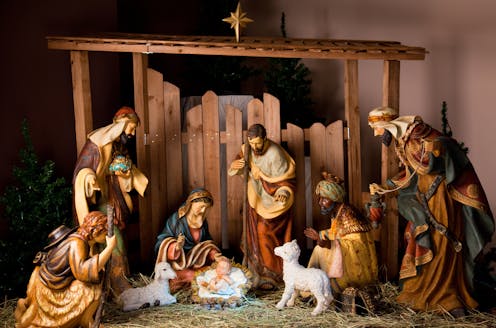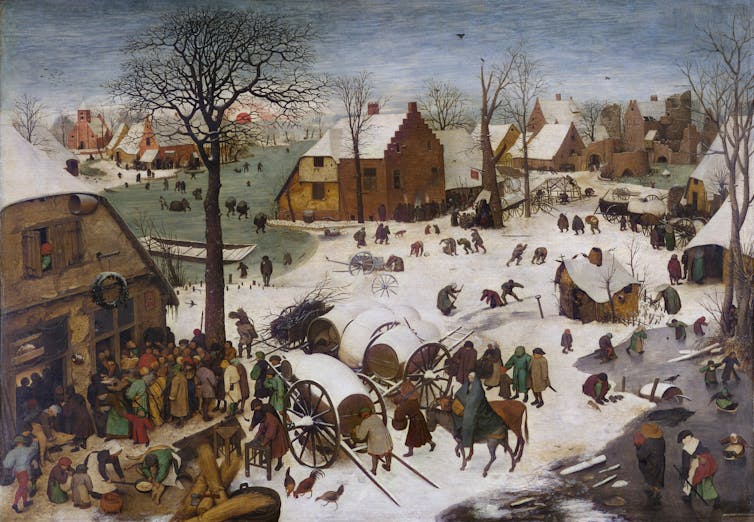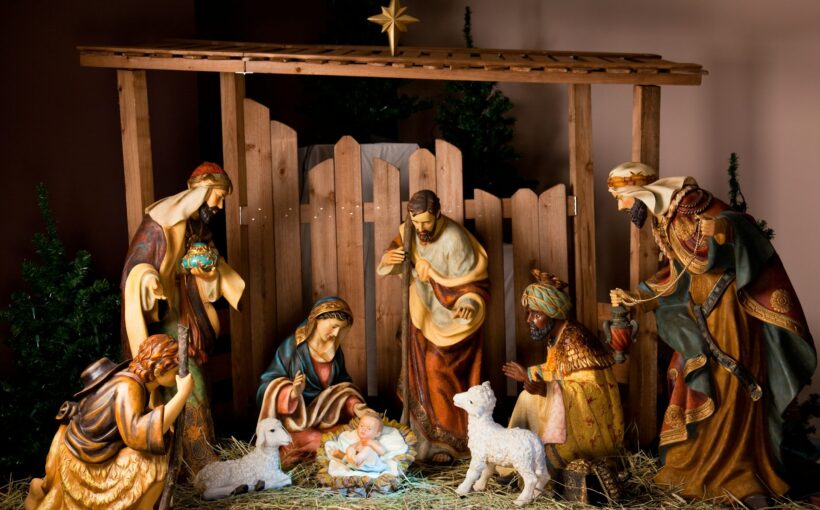
Despite the secularisation of Christmas, biblical symbolism seems to be everywhere at this time of year.
From images of the Virgin Mary on Christmas cards to carols about the little donkey, the baby Jesus in nativity scenes and the three kings in school plays, there’s no shortage of retellings of the biblical story of Jesus’ birth.
Most cultural representations of Jesus’ birth are a combination of the accounts in the gospels of Matthew and Luke – there is no mention of Jesus’ birth in the gospels of Mark or John. Luke is the main source of the Christmas story, while Matthew’s gospel emphasises the virgin birth.
But some of best-known parts of the Christmas story aren’t in the Bible at all.
Although Christmas is a Christian festival celebrating the birth of Jesus, the Bible offers scant information on when Mary gave birth.
In fact, there’s very little about Jesus’ birth and infancy in the gospel accounts as a whole – his early life only became of interest later because of his ministry. What the Bible does tell us is that there were few people at Jesus’ birth: only his parents, shepherds who attended later, followed by a visit from the magi (the wise men).
Not a silent night
According to the gospel of Luke, Caesar Augustus issued a decree that a census should take place, and each person would need to go to their own town to register. If it was census time, and there were no guest rooms available, it’s unlikely the night of Jesus’ birth was silent.
This idea of a noisy, populated town was captured by the artist Pieter Bruegel in the 1566 painting The Census at Bethlehem.

The traditional silent, holy night of Christmas Eve in carols and films would more likely have been a bustling, busy night in Bethlehem.
Little donkey
Luke 2:4 says that Joseph went from Nazareth in Galilee to Bethlehem to register with Mary. The account does not tell us how they travelled – and riding a donkey while heavily pregnant would likely have been deeply uncomfortable.
In fact, not only is there no donkey, there are no animals at all in the Bible’s nativity episode.
Read more: An ox, an ass … a dragon? Sorry, there were no animals in the Bible’s nativity scene
Inn keeper and his stable
Many of us will remember the character of the inn keeper from the school nativity play. The one who says, “There’s no room at the inn,” to Mary, Joseph – and, of course, the donkey.
But this character does not appear in the biblical text. Luke’s gospel says only that “there was no guest room available for them”. Neither does the Bible mention a stable. A stable is assumed to be Jesus’ birth place because of the lack of guest rooms and because Jesus was laid in a manger, a feeding trough for animals.
Three wise men
Matthew 2:11 tells us that the wise men were secretly sent by Herod to find the child so he could worship him. They were guided by the star and entered a “house” (not a stable then). We know there were three gifts – gold, frankincense and myrrh – but the Bible doesn’t give the number of magi who presented them.
But perhaps we can excuse the many cultural representations of the nativity that veer from the brief biblical accounts. The account of Jesus’ birth in Luke 2 is only four lines long, after all. So it’s no wonder so many of the well-loved elements of the Christmas story are embellishments to an otherwise sparse text.
![]()
Chris Greenough does not work for, consult, own shares in or receive funding from any company or organisation that would benefit from this article, and has disclosed no relevant affiliations beyond their academic appointment.



